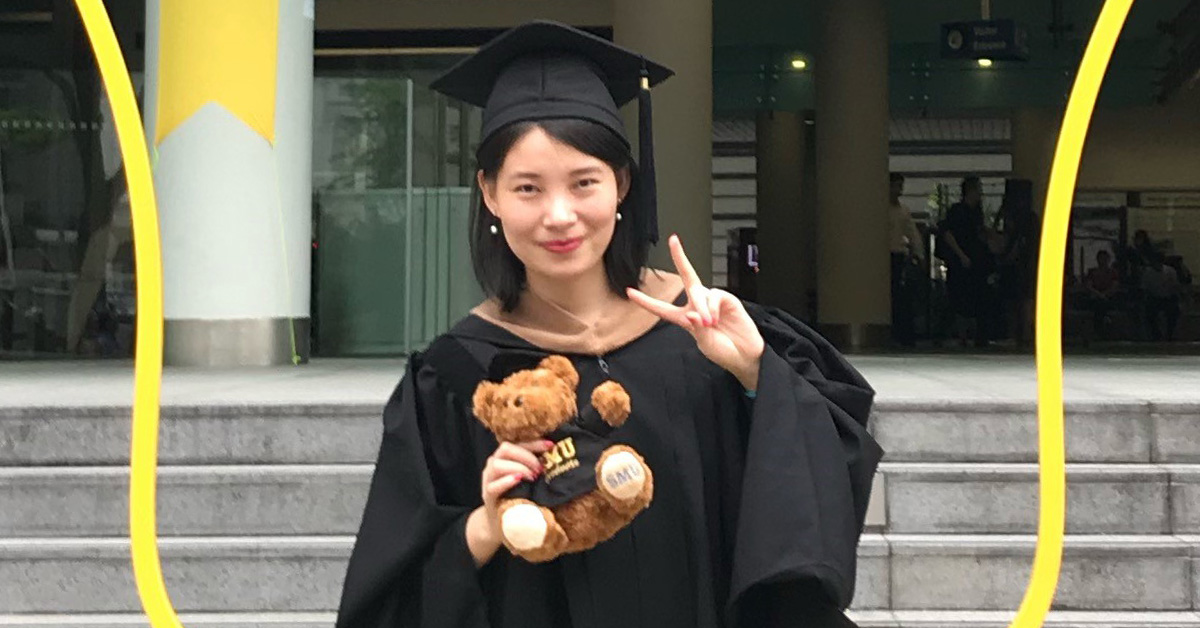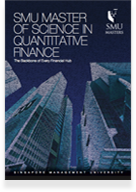
In an era of intense economic and political volatility, it appears nothing short of clairvoyant abilities are required to make sense of current financial markets. Thankfully for the less psychically endowed, quantitative finance lies at the intersection of finance, statistics, applied mathematics and computing. As the global financial industry becomes more sophisticated in risk management, product innovation, and proprietary trading, the demand for quantitative finance professionals is on an uptick.
Alyssa Gao, a recent graduate of the SMU LKCSB Masters in Quantitative Finance (MQF) programme is one such professional who has harnessed the opportunities presented in the field. She is now a Quantitative Analyst - Assistant Vice President with OCBC Bank.
Having graduated with a Bachelor’s degree in Electrical Engineering, it was Alyssa’s interest in online trading that initially piqued her interest in finance, prompting her decision to enrol in the MQF programme, which she describes as “a fast-paced, intense, and well-designed one-year programme”.
Now specialising in assessing market risk in asset and liability management, Alyssa explains that the transition from engineering to finance, “is not a huge leap … as many skills are transferable such as programming and problem-solving skills”. In addition, she states that quantitative trading and portfolio management are often heavily reliant on mathematical modelling, “so the same philosophies of model validation apply in engineering and finance”.
Part of the draw of the MQF is how it is uniquely developed with a blend of theoretical knowledge, practical applications and creativity in problem-solving. It is not just about gaining an in-depth knowledge of quantitative finance. In fact, there is a strong focus on the application of knowledge, whereby elective modules are developed and taught by leaders in the industry.
“Expertise in coding and math are no doubt the foundations of a quant,” admits Alyssa.
“Theoretically, we learn about the foolproof ‘science’ of quantitative finance. However, in practice, a balance between an unbreakable model, which could be long and costly to implement, and a simple model that is subject to imperfections, but easy to implement, needs to be achieved.”
This practice-based approach was one of the key attractions for Alyssa with the MQF syllabus being “very close to what is actually used in the industry” and the assignments being highly practice-based.
The programme is offered on a full- or part-time basis, and also has an option for full-timers to embark on the international track where 2 out of 5 terms are based at the CASS Business School in London. Alyssa chose to study full-time while holding on to her job. While the evening and weekend class schedules made this feasible, she explains, “time management and the ability to prioritise were very important – this helped to kill procrastination – I didn’t have time to waste thinking about doing it, I just had to get on and do it”.
The programme also offers a comprehensive job placement scheme, often with alumni visiting the class - facilitating direct contact with hiring stakeholders. Students also have other opportunities to gain insights and interact with potential employers with industry talks and networking events being a regular feature. Alyssa suggests that interactions with professors, alumni and industry experts are also key aspects of the programme, but that you have to make the most of the opportunities: “be proactive and ask very specific questions”.
Besides its combination of theory and practice, the MQF programme also encourages entrepreneurial and creative ways of thinking, so as to tackle new problems in the finance industry and beyond. As Alyssa points out, with intense competition in the banking sector, particularly from alternative online products, and the increased challenges of managing liquidity, banks need to stay relevant. In her role at OCBC, Alyssa is actively utilising her knowledge base, rooted in engineering and quantitative finance, to address these issues.
“The fear of falling behind in the era of rapid digital change keeps me motivated,” adds Alyssa. “Many jobs are in the process of being eliminated. Implementation engineers like quants, on the other hand, will always stay relevant if we are willing to upgrade our skill sets.”
Speak to our Admissions Advisors
Lee Kong Chian School of Business
Postgraduate Admissions
Singapore Management University
Lee Kong Chian School of Business
Graduate Programmes Office, Level 4
50 Stamford Road, Singapore 178899
Tel: +65 6828 0882
Join us at the upcoming events
Ofukacho, 1−1 ヨドバシ梅田タワ
Osaka, Kita Ward, 〒530-0011, Japan
Kyobashi, 1 Chome−3−5 三井ガーデンホテル 1F
Chuo City, Tokyo, 〒104-0031, Japan
Lee Kong Chian School of Business
Level 4, Postgraduate Office
50 Stamford Road
Singapore 178899
We will be sending the zoom link 2 hours before the start of the event.
You are required to download the Zoom app & sign
